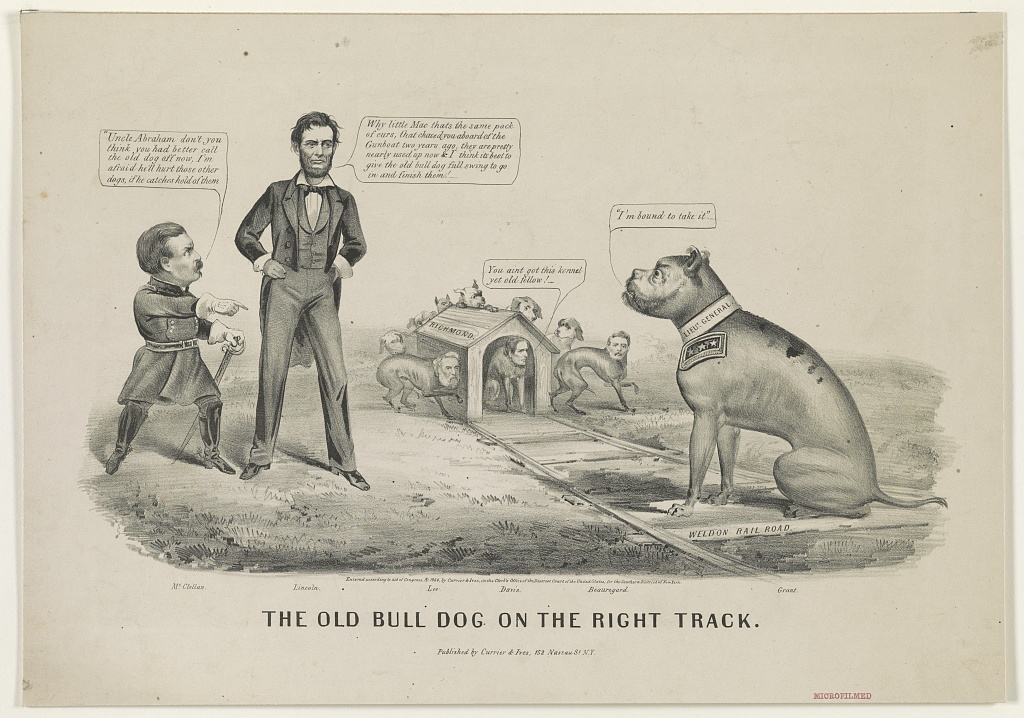Elections 1864 Style: On Track?
This Currier & Ives political cartoon from 1864 recently caught my attention as I was scrolling through the Library of Congress’s online archives.

Charactures of Abraham Lincoln and George McClellan, the presidential candidates in 1864, are depicted in conversation, but General Ulysses S. Grant – sketched as a bulldog – strongly influences the situation. The bulldog sits on the Weldon Railroad, a key supply route that General Grant fought over and eventually controlled during the last half of the year. Confederate leaders – also depicted as dogs – hide out in their dog house, which represents Richmond and Petersburg. The Jefferson Davis figure barks “You ain’t got this kennel yet, old fellow!” The Grant Bulldog replies: “I’m bound to take it.”
The scene prompts the dialog between McClellan and Lincoln. Diminutive McClellan says a bit fearfully, “Uncle Abraham, don’t you think you had better call the old dog off now. I’m afraid he’ll hurt those other dogs, if he catches hold of them.” To which Lincoln responds, “Why little Mac that’s the same pack of curs, that chased you aboard of the Gunboat two years ago, they are pretty nearly used up now. I think its best to give the old bull dog full swing to go in and finish them!”
The political cartoon is full of stereotypes, particularly about McClellan’s short physical stature and the perception of his timidness. However, it does accurately reflect the choke-hold that Grant had on Confederate supply lines to Petersburg and Richmond by the autumn of 1864. It also reinforces that Lincoln intended to finish the war while McClellan might be more likely to seek a peace settlement with the Confederacy.
It reminded me of the importance of military events in the 1864 Presidential Election, and how almost every election makes the claim that THIS year defines our nation and will decisively preserve the republic or safeguard democracy. While I sometimes find the rhetoric tiresome, it is valuable to recognize that our system of government established by the U.S. Constitution, guarded by the Constitutional Amendments, and sometimes defended by military members does sit on the brink. The Great Experiment was started by the Framers, defended by Union volunteers, and transformed to protect Civil Rights is an on-going story. The Civil War is a chapter in that story; today, we are hopefully “on track” (though probably not the Weldon Railroad) to help to write the next chapter for representation and hopefully a peaceful transition of power for local, state, and congressional government.
The reference to “the same pack of curs, that chased you aboard of the Gunboat two years ago” is to an incident during the 1862 Battle of Malvern Hill. McClellan observed the battle while safely aboard the gunboat Galena. McClellan was derisively referred to “the gunboat candidate” in another Currier & Ives print. See cite below:
https://www.loc.gov/pictures/resource/cph.3b38362/
I ALWAYS find the rhetoric tiresome. Especially this year. The wailing about “democracy on the brink,” the “coming authoritarianism,” etc. I predict contemporary hyperbole will not age well.
Questions about election integrity have always been raised. I know in 1864 the soldier vote was a big deal, but to what extent did integrity/suppression play a role in shaping attitudes? I’m thinking in particular in areas of Copperhead influence.
Should add I know in Maryland, loyalty oaths as a prerequisite to voting were a big thing.